Tips for growing chives
Written by Joy
Oct 16 2020
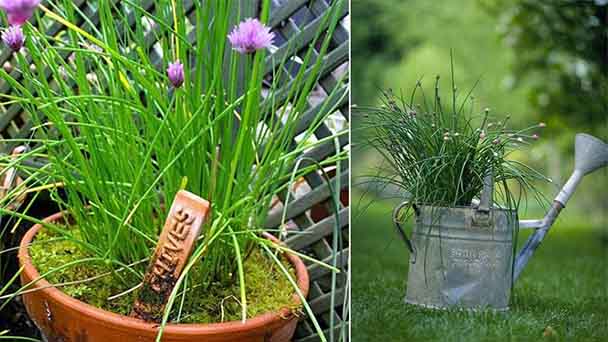
The chives look green, smell very delicate and easy to grow. They can be bought every season, so they are one of the more common seasoning ingredients in the kitchen. If you need to use them, it will be more troublesome to buy some. It's so convenient to grow chives at home. Let's take a look at some tips for growing fresh chives.
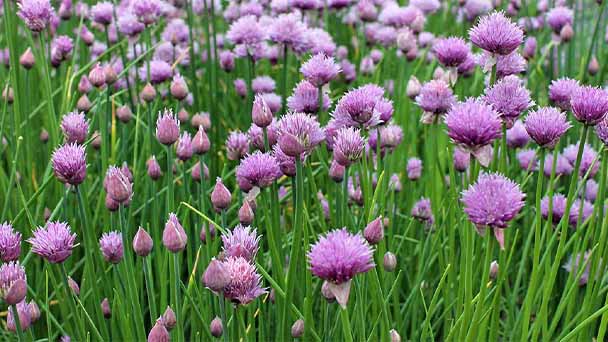 The light intensity is medium, and it is easy to age under strong light conditions and the quality will deteriorate. The water source, soil, and air quality should meet the requirements of pollution-free origin.
The light intensity is medium, and it is easy to age under strong light conditions and the quality will deteriorate. The water source, soil, and air quality should meet the requirements of pollution-free origin.
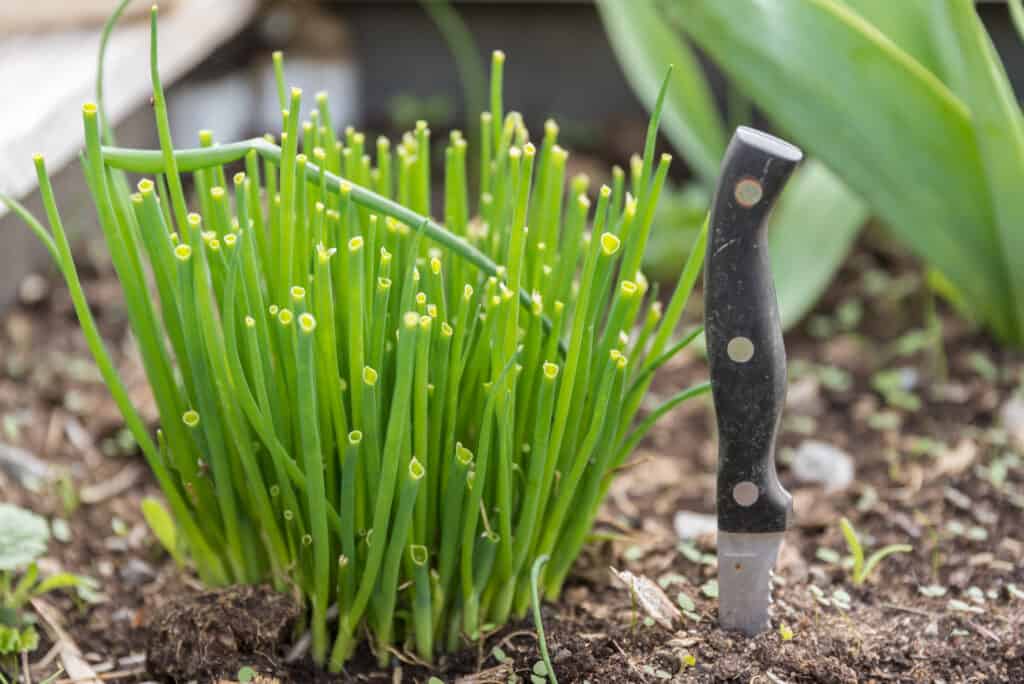 When dividing the chives plants, you'd better pay attention to bury the whole onion in the soil, and lightly cover it with a layer of fine soil.
When dividing the chives plants, you'd better pay attention to bury the whole onion in the soil, and lightly cover it with a layer of fine soil.
2. It's a good choice to cut off the top leaves and cook chives, and don't throw the remaining roots of fresh chives into the trash as usual. When cutting, you'd better leave the roots slightly longer, so that it is easy to plant and quick to survive.
3. Gardeners should prepare flower pots and soil to grow chives. It doesn't matter if you don't have extra flower pots in your home. You could see if there is any space in the pots where you have planted roses or other flowers, you can make full use of it to save space, maybe the smell of green onions can also protect against pests. The soil is fertile leaf mulch plus some decomposed cake fertilizer.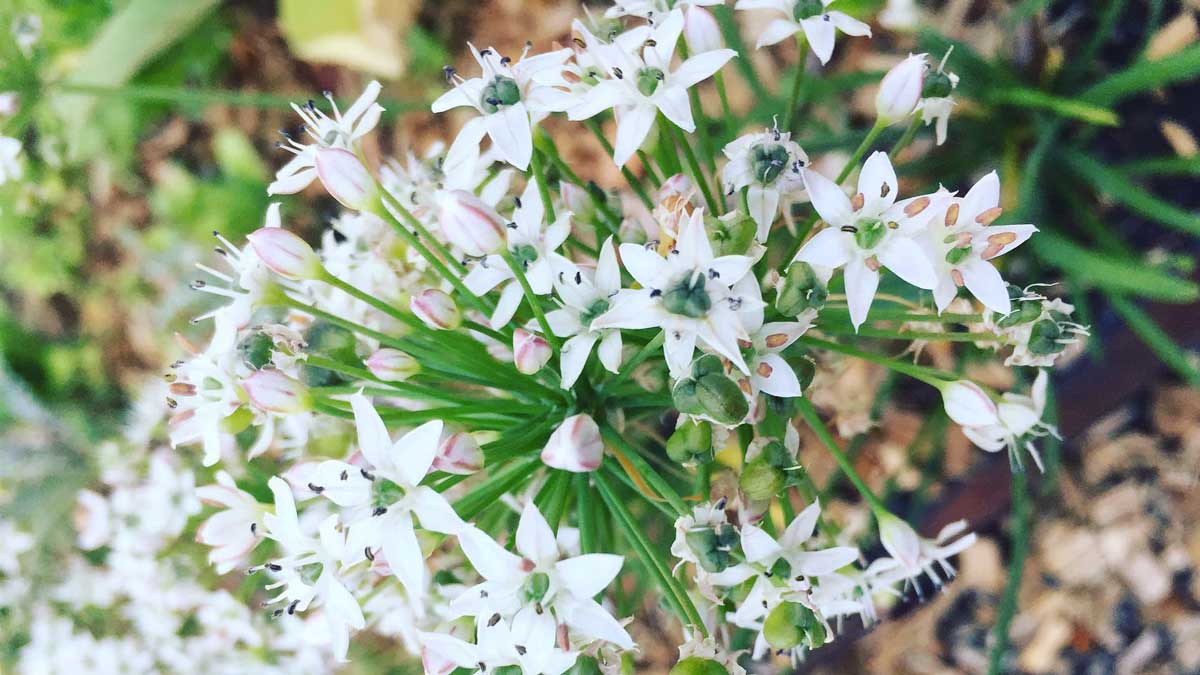 4. You could dig a small hole in the pot and bury the onion roots. You'd better not plant too much chives in one hole. This can ensure that the nutrition in the later period can keep up. You'd better not cover too much. After covering the soil, gently flatten it with your hands to prevent the roots of fresh chives from running out during watering.
4. You could dig a small hole in the pot and bury the onion roots. You'd better not plant too much chives in one hole. This can ensure that the nutrition in the later period can keep up. You'd better not cover too much. After covering the soil, gently flatten it with your hands to prevent the roots of fresh chives from running out during watering.
5. Pour enough water and place it in a sunny place (short-term storage in a shaded place is fine, but it will still be exposed to the sun in a few days). The survival rate of fresh chives is almost 90%. As long as it is not the temperature below freezing in winter.
6. After more than a week, new shoots grew from the roots of the onion, and they gradually grew up. At this time, you can fertilize more, because you eat it yourself, it is recommended to use organic fertilizer for fertilization.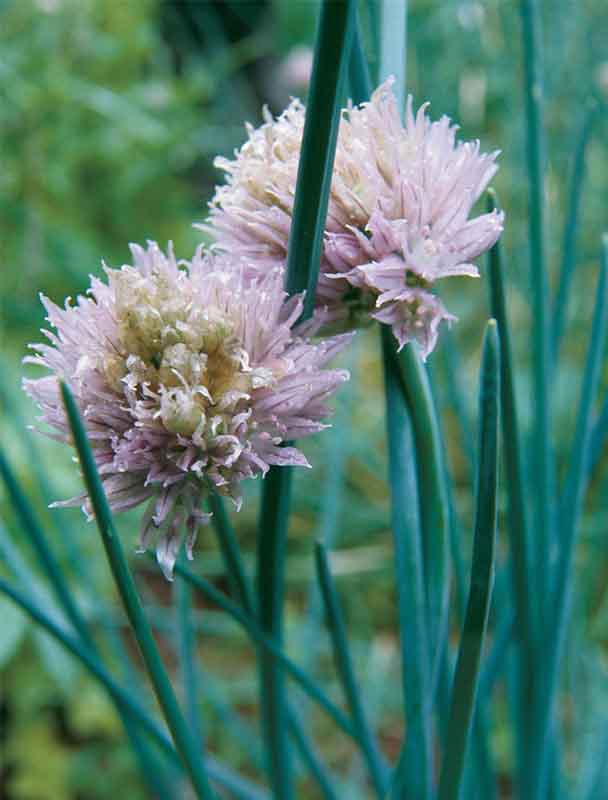 7. If you usually want to eat chives, you'd better not pull up the roots, just cut off the food. This ensures that you can continue to eat next time, which is convenient and labor-saving. And it adds a seductive green to the home.
7. If you usually want to eat chives, you'd better not pull up the roots, just cut off the food. This ensures that you can continue to eat next time, which is convenient and labor-saving. And it adds a seductive green to the home.
2. Chives need sufficient light throughout their growth period. It's necessary to keep the soil moist during cultivation.
3. The soil requirements are not strict, and fertile soil with good drainage is suitable.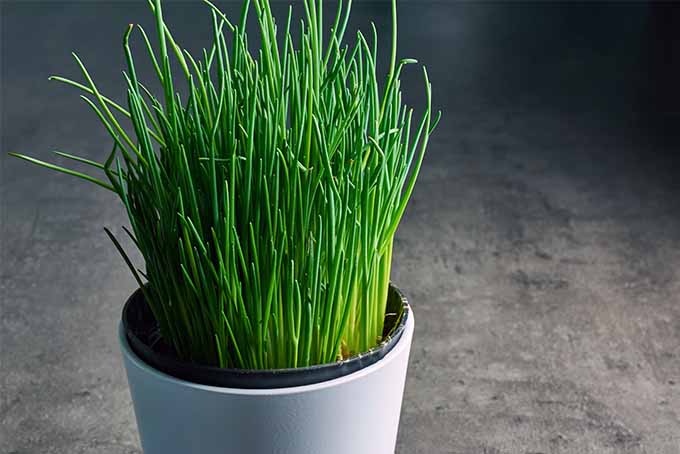 4. After transplanting chives, water should be sufficient for planting water. Because the root system is relatively shallow, chives is not tolerant of concentrated fertilizer and drought. It needs small water and frequent watering to keep the soil moist.
4. After transplanting chives, water should be sufficient for planting water. Because the root system is relatively shallow, chives is not tolerant of concentrated fertilizer and drought. It needs small water and frequent watering to keep the soil moist.
2. The phytoncide contained in chives has a strong bactericidal effect, especially for dysentery bacilli and skin fungi. The pectin contained in chives can significantly reduce the occurrence of colon cancer and has anti-cancer effect. Allicin in chives can also inhibit the growth of cancer cells.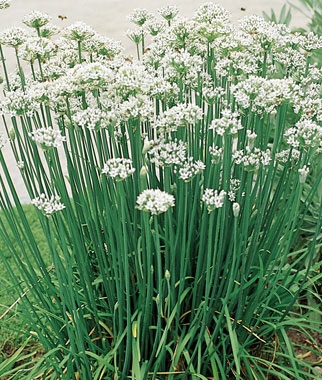 3. Chives can prevent respiratory infections and effectively treat colds and colds. Once a person has sneezing, watery eyes, runny nose and other symptoms, take the white onion and chew until sweating can cure the disease.
3. Chives can prevent respiratory infections and effectively treat colds and colds. Once a person has sneezing, watery eyes, runny nose and other symptoms, take the white onion and chew until sweating can cure the disease.
4. Eating more chives can improve the digestive function of the human body, invigorate the spleen and appetite, increase appetite, and can remove the dirt and turbid gas accumulated in the stomach and intestines.
5. People who are prone to eye fatigue and suffer from insomnia and neurasthenia can be energetic and improve our work efficiency by eating more onions.
6. The active ingredients such as the volatile oil of fresh chives can stimulate the sweat glands of the body and achieve the effect of sweating and heat dissipation; the shallot oil stimulates the upper respiratory tract and makes the phlegm easy to spit out.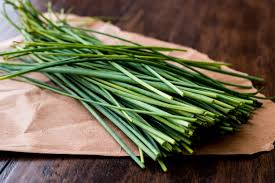 7. The white part of chives contains a large amount of shallot, which can stimulate the secretion of norepinephrine, thereby promoting the decomposition of body fat. Therefore, if you eat more chives , the body's heat release will be enhanced, which will reduce the accumulation of fat.
7. The white part of chives contains a large amount of shallot, which can stimulate the secretion of norepinephrine, thereby promoting the decomposition of body fat. Therefore, if you eat more chives , the body's heat release will be enhanced, which will reduce the accumulation of fat.
8.Fresh chives are engaged in cleaning the human body. People suffering from anemia and low blood pressure can eat more onions to replenish energy.
Environmental requirements
Small wild chives are resistant to cold and heat, and can be planted in all seasons. The optimum growth temperature is 18℃-23℃, the root system of chives is shallow, the water demand is small, and it is not tolerant to drought. It is suitable for planting in sandy soil.
Mode of reproduction
Sowing
Sowing can be carried out in spring, summer, autumn and winter. It's a good choice to choose fertile and loose soil.Branches

Planting method of chives
1. For the small chives that you bought, it is best to choose green, fresh leaves and good roots. You'd better not damage the roots, and some dirt on it does not need to be cleaned.2. It's a good choice to cut off the top leaves and cook chives, and don't throw the remaining roots of fresh chives into the trash as usual. When cutting, you'd better leave the roots slightly longer, so that it is easy to plant and quick to survive.
3. Gardeners should prepare flower pots and soil to grow chives. It doesn't matter if you don't have extra flower pots in your home. You could see if there is any space in the pots where you have planted roses or other flowers, you can make full use of it to save space, maybe the smell of green onions can also protect against pests. The soil is fertile leaf mulch plus some decomposed cake fertilizer.

5. Pour enough water and place it in a sunny place (short-term storage in a shaded place is fine, but it will still be exposed to the sun in a few days). The survival rate of fresh chives is almost 90%. As long as it is not the temperature below freezing in winter.
6. After more than a week, new shoots grew from the roots of the onion, and they gradually grew up. At this time, you can fertilize more, because you eat it yourself, it is recommended to use organic fertilizer for fertilization.

Precautions
1. Chives like cold, hardy, and intolerant to high temperatures. The optimum temperature for growth is 15-25°C. The chives plant grows thinly above 25°C, and the quality is poor. When it is above 35°C, the growth stops and the leaves will wither.2. Chives need sufficient light throughout their growth period. It's necessary to keep the soil moist during cultivation.
3. The soil requirements are not strict, and fertile soil with good drainage is suitable.

The pros and cons of eating chives
The benefits of eating chives
1. Chives are rich in nutritional value, mainly containing protein, fat, carbohydrates, vitamin A, vitamin B, vitamin C, and minerals such as calcium, magnesium, iron, and phosphorus, which can supplement a variety of elements required by the human body. Chives can timely supplement our nutrition.2. The phytoncide contained in chives has a strong bactericidal effect, especially for dysentery bacilli and skin fungi. The pectin contained in chives can significantly reduce the occurrence of colon cancer and has anti-cancer effect. Allicin in chives can also inhibit the growth of cancer cells.

4. Eating more chives can improve the digestive function of the human body, invigorate the spleen and appetite, increase appetite, and can remove the dirt and turbid gas accumulated in the stomach and intestines.
5. People who are prone to eye fatigue and suffer from insomnia and neurasthenia can be energetic and improve our work efficiency by eating more onions.
6. The active ingredients such as the volatile oil of fresh chives can stimulate the sweat glands of the body and achieve the effect of sweating and heat dissipation; the shallot oil stimulates the upper respiratory tract and makes the phlegm easy to spit out.

8.Fresh chives are engaged in cleaning the human body. People suffering from anemia and low blood pressure can eat more onions to replenish energy.
The disadvantages of eating chives
Although there are many benefits to eating chives , medical experts remind us that we should also eat in moderation. Especially in summer, if you eat fresh chives too much, you will secrete many white things in your eyes, which will make your eyes uncomfortable. In addition, it should be noted that chives should not be taken orally with honey. Those with excessive sweating should not eat it.Latest Updated
- Benefits of Bugleweed - 7 Science-backed Health Benefits
- Bugleweed Dangers & Side Effects - Is It Poisonous?
- How to Plant Evergreen Trees - What You Should Know
- When to Plant Evergreens - Grow Guide for Evergreen Trees
- 12 Wonderful Evergreen Shrubs for Your Garden
- 12 Popular Evergreen Plants with Pictures for Beginners
- When And How To Prune A Lilac Bush Like a Pro
- How to Grow & Care for Lilac Vine (Hardenbergia Violacea)
- Japanese Lilac Tree (Syringa Reticulata) Care & Propagation Guide
- Shumard Oak Pros and Cons - What to Know
Popular Articles
- Winter maintenance of Antirrhinum Majus
- How to Grow Terminalia Mantaly Tree
- How to Grow and Care for Crossostephium Chinense
- How to grow Antirrhinum Majus in spring
- Peristeria Elata (Dove Orchid) Profile: Info & Care Guide
- Underwatered Snake Plant (Sansevieria Trifasciata) - Signs And How To Fix
- How to Care for Brazilian Jasmine Plant (Mandevilla Sanderi)
- How to Grow & Care for Graptopetalum Purple Delight in Summer
- Rosa Chinensis (China Rose): Plant Growing & Care Tips
- How to Care for Baby Sun Rose (Aptenia Cordifolia)